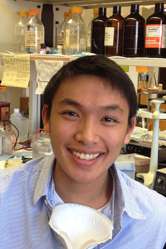Major: Biochemistry

What research experiences have you had?
I have been an Undergraduate Research Assistant in Dr. Summers’ lab since January 2014
How did you find the research opportunity?
A grant from HHMI to promote underrepresented minorities in research allowed nine students from my Meyerhoff Scholars Program cohort to rotate through a number of on-campus research labs. The first (and only) lab I rotated in was the Summers Lab, which provided an unparalleled experience that included research on very relevant and up-and-coming fields and mentorship that has guided my growth as a scientist.
Who did you work with on this project?
Under the mentorship of Dr. Michael F. Summers, I was in a group led by post-doctoral fellow Dr. Sarah Keane, working with other undergraduates, Gregory “Cam” Carter, Steven Choi, Alyssa Florwick, and Sayo McCowin.
Do you get course credit for this work? How much time do you put into it?
I must spend a minimum of 10 hours in lab. However, I have the option to work in lab for credit at 12 hours per week, which I am currently enrolled in.
What academic background did you have before you started?
Before I started, I had no background in research. In terms of STEM, I had a few classes under my belt: introductory chemistry, biology, physics, and engineering.
How did you learn what you needed to know to be successful in this lab?
Being successful in this lab took a number of factors. The main idea behind building myself up as a researcher and as a scientist overall was to be open to learning, making mistakes, and to recognize how I could change and improve. Everything else fell in place around that, from learning lab techniques to applying knowledge in class to the bench.
What did you gain from presenting your work at the Annual Biomedical Research Conference for Minority Students (ABRCMS)?
Presenting my work at ABRCMS allowed me a unique perspective into research and collaboration. Primarily aimed at undergraduates, it is an excellent conference in terms of providing network opportunities with labs at other universities. At the same time, I got to see the span of research not only in my field but in STEM in general. I was able to practice presenting my work to the scientific community in order to have it critiqued and discussed by other researchers in my field.
What is your advice to other students about getting involved in research?
For anyone going involved into research, whether it is a requirement or not, I have to dispel the stereotype that research is “boring” and “uninteresting.” Yes, it can be a lot of work, but the nature of research is characterized by hard work. You will encounter frustrations and times where the protocol will simply not go your way. The best way to succeed is to always keep the end in mind. More importantly, as an undergraduate, getting involved in research is ultimately for developing your ability to think as a scientist and exercising excellent execution of the scientific process, more than it is performing protocols and running experiments. Having no experience should not at all deter you from getting involved. It is never too late to start. That being said, my final word on this is that any experience good or bad, should not be your final measuring stick for research in general. It is always going to depend on the people you work with and the atmosphere you work in.
What are your career goals?
After my undergraduate studies, I plan to obtain an M.D./Ph.D.
12/7/2021